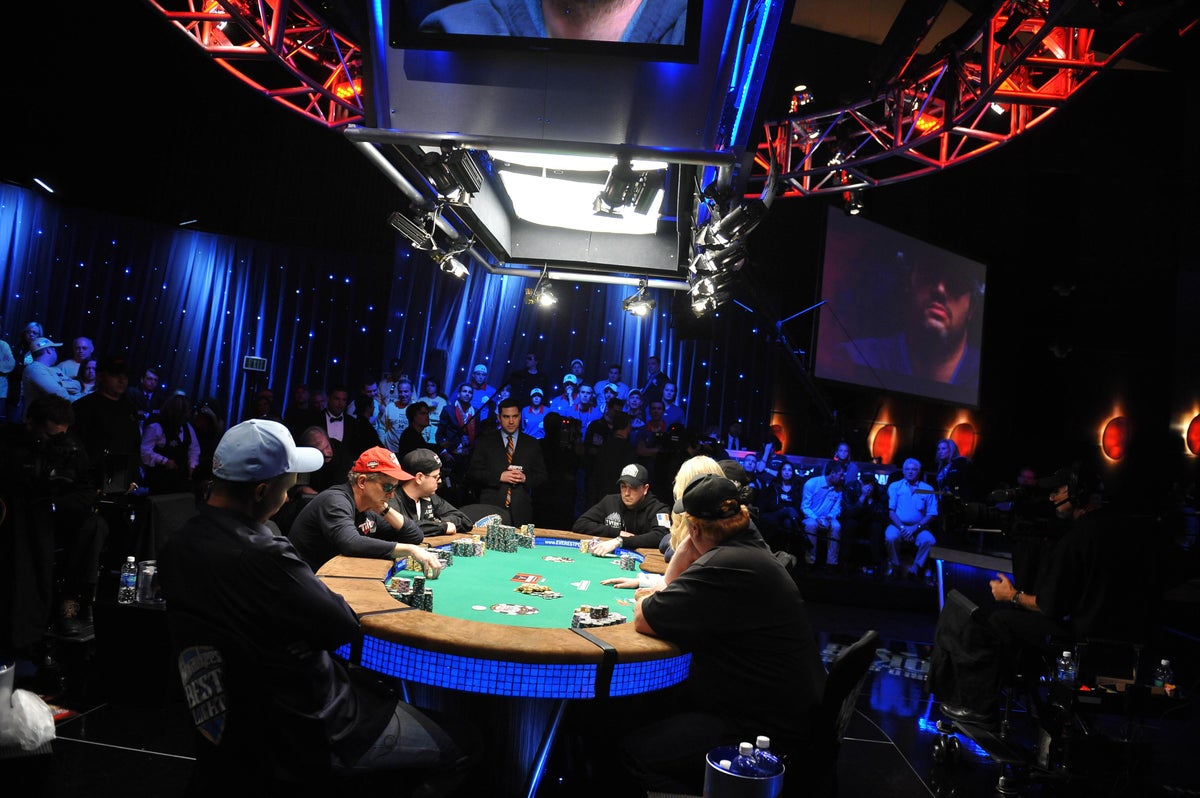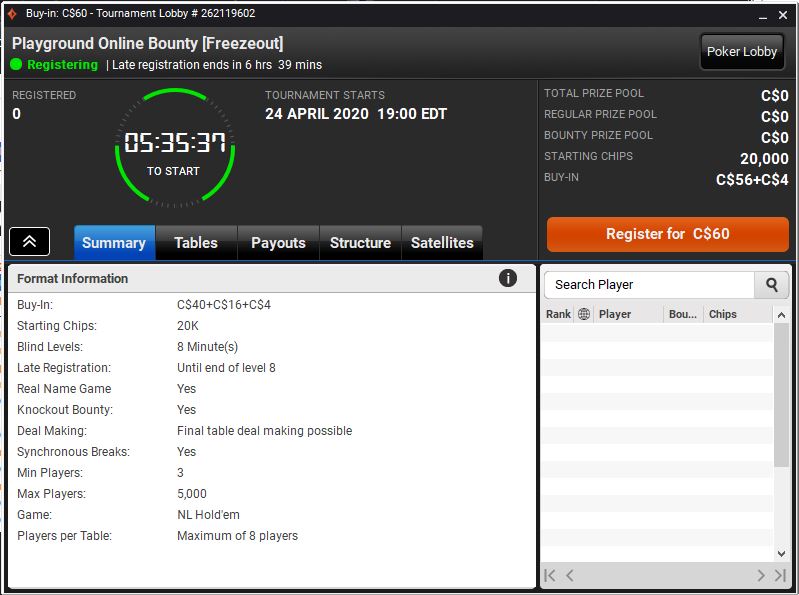Poker Final Table Deal Making
- Poker Final Table Deal Making 2018
- Poker Final Table Deal Making 2017
- World Series Of Poker Final Table
- Poker Final Table Deal Making 2020
I know on PS, there is a deal making button thats available to everyone on the final table. Once the players press it, the tournament pauses, and the deal numbers are show based on chips. Apr 10, 2014 Jared Tendler on Final Table Deal Making, Backers Playing With Horses and a Whole Lot More BY Lee Davy ON April 10, 2014 TAGs: audio interview, Deal Making, Final Tables, Jared Tendler, Lee.
This is the third installment in a series of articles on the topic of deal-making at the final table. Although this is a stand-alone article, the reader may want to also read the previous two for some extra context — 'To Chop or Not to Chop? Explaining Standard Deal-Making Methods' and 'The 4 Big Questions of Final-Table Deal-Making.'
To make matters concrete we are continuing to use the specific example of a final table deal described below. They've made the money, and three players (Alice, Bob, and Charlie) are left with the stack distribution 50%, 30%, and 20%. We're also again assuming that Alice is the most skilled player while Charlie is the least experienced of the three.
| Rank | Prize | Player | Skill Level | Chips |
|---|---|---|---|---|
| 1st place | $900 | Alice | Excellent | 50% |
| 2nd place | $400 | Bob | Average | 30% |
| 3rd place | $200 | Charlie | Poor | 20% |
In the first article, we calculated the exact share proposed for each player according to 3 different deal-making methods — an equal chop, a chip chop, and an ICM chop.
| Player | Equal Chop | Chip Chop | ICM Chop |
|---|---|---|---|
| Alice | $500 | $750 | $618 |
| Bob | $500 | $450 | $485 |
| Charlie | $500 | $300 | $397 |
Explaining Standard Deal-Making Methods,' explained differences between final-table deals in tournaments — the equal chop, the chip chop, and the ICM chop. After having analyzed these standard. When we got to the final table in the Ladies No Limit event at the Oklahoma State Championship of Poker at the Hard Rock Casino in Tulsa, the players were interested in making a deal and asked me.
We also made a case that the ICM chop is the fairest of the three, as it models the situation the best by accurately calculating the chances for each player to receive each different prize. Unfortunately, ICM falls somewhat short as it assumes not only equal skill among the players but also a 'robotic' use of their stack, without levering its size.
This is why we introduced the concepts of skill-stack premiums and skill-stack discounts. Roughly speaking, these are the theoretical 'bonuses' (or 'penalties') that should be added (or subtracted) to the ICM share in order to account for skill and stack differentials.
For instance, since Alice is both the best player at table and also has the largest stack, her tournament life is worth more than what ICM suggests. Conversely, since Charlie is the least experienced player at the table, his smallest stack is certainly worth less than what ICM predicts.
Introducing these concepts has some very important consequences. Alice, for example, should never accept any amount close to $618, especially if the blinds are relatively small compared to the stacks (a factor we will examine in more detail later).

The question then becomes: How much should she accept? The bad news is there is not a definitive answer to that question since we have no way of properly quantifying her skill-stack differentials. However, the good news is we know from experience that they exist and — perhaps more importantly — we also know that they affect the ICM model. Therefore, it would make sense to act as if they are there, even without necessarily knowing their precise values.
How can we do that? Let's approach each situation differently and discuss a few important steps a player can take in the right direction.
Skill-Stack Premium (Alice's position)
As the chip leader and the best player at the table, Alice should push the negotiating envelope as much as she can and perhaps even start by asking the rest of the table if they would give her first-place prize money ($900). As preposterous as this request may sound (no one can win more than first prize money after all!), there may be players at the table who are at serious risk of busting out of the tournament, thus be willing to pay towards her premium.
Taking our example above, say that Alice is aggressively attacking blinds left and right (as she should). Charlie — who doesn't know how to defend properly — is afraid that he may get knocked out in third place. As a result, he may agree to an amount close to $250 which is more than third-place money.
At the same time, despite any skill differentials, Bob's main concern is that he will get knocked out before Charlie (or even by Charlie, whose stack is similar to his). Moreover, since first place seems tough to reach for Bob, he may eventually agree to $350 which is almost second-place money. If he does, a deal could be made that looks as follows:
| Alice's Best Case | Prize |
|---|---|
| Alice | $900 |
| Bob | $350 |
| Charlie | $250 |
Of course, no matter how good Alice is, there is still a non-zero chance for her not to finish first, thus making the above proposal highly unfair for the two gentlemen. However, the point is that risk-averse players may be willing to pay more than they should in order to secure a certain cash prize. This is why we already made the case that it is of the utmost importance to know what other players want.
If Bob or Charlie refuse (as they should!), Alice could attempt to 'sweeten the deal' by offering another $100 from 'her' prize money, and split the rest based on the 3-to-2 chip ratio between Bob and Charlie — that is, Bob and Charlie would split the rest of the money 60-40. This would look something like this:
This is still an incredible deal for Alice who now gets almost $200 above ICM!
If her second proposal gets declined as well, she could now try to push for a chip chop. As we have seen already, the rule of thumb is that a chip chop favors the big stacks as it assumes an above average share for them on all cash prizes. Alice, as the chip leader, should generally be very happy with that:
| Chip Chop | Prize |
|---|---|
| Alice | $750 |
| Bob | $450 |
| Charlie | $300 |
If that doesn't work either, Alice should consider whether or not she wants to try to get a smaller skill-stack premium or continue playing and try to knock another player out before another deal is discussed.
One very important detail to consider is the size of the blinds compared to the stack sizes. In general, the deeper the game, the more skill and stacks matter. For instance, if Alice has 50 blinds (and thus Bob 30 and Charlie 20), there is still plenty of room for maneuverability and postflop play. This should incentivize Alice either to go for a higher prize or to continue playing.
On the other hand, if Alice only has 25 blinds (and Bob 15 and Charlie 10), she should happily accept any amount around $700. That's because her strategic options and thus her skill-stack premium are now both greatly reduced. As the blinds increase, the 'luck factor' progressively gains solid ground over the 'skill factor,' eventually forcing the latter to exist only in the form of one-street poker and preflop push-fold play.
Poker Final Table Deal Making 2018
This is a fancy way of saying that poker becomes a 'crapshoot' when stacks get short. For that reason, if the stacks are shallow it would make sense for Alice to consider lesser offers. Still, she should definitely shoot for an amount above ICM ($618) as her skill-stack advantage is definitely worth something!
| Alice's Worst Case | Prize |
|---|---|
| Alice | $700 |
| Bob | $480 |
| Charlie | $320 |

Poker Final Table Deal Making 2017
Skill-Stack Neutral (Bob's position)
Roughly speaking, a player is at a skill-stack neutral position if he or she either ranks average in both domains, or perhaps lacks in one but is above average in the other to compensate.
For example, Bob above is at a skill-stack neutral position. Similarly, Charlie and Alice would both be skill-stack neutral if Charlie were the strongest player and Alice were the weakest. (In Charlie's case, his skill would compensate for his short stack, while in Alice's case her stack size would compensate for her relative lack of skill.)
Being at a skill-stack neutral position makes matters rather easy, as there is neither a premium nor a discount applicable in this case, making the ICM suggestion a fair one.
Of course, for those desiring to make the best deal possible, there is always the option to suggest a chop that grants them an amount above ICM. This may work, especially if the rest of the table really wants to end the tournament right then and there.
Naturally, it is rather ill-advised to be rigid during negotiations as this may turn everyone else off and not only result in an offer being rejected, but also shut down all further discussions for alternatives. Instead, a more subtle approach is highly preferred. For example, say Bob (with his 30% stack and no skill-stack premium) wants to try to get an amount above ICM. He may try it by saying something like:
'I mean no disrespect to anyone, but my goal was to make at least $500 in this tournament. If this is not something you can do, I totally understand and I will happily continue playing.'
Since Bob's ICM is already $485, it is not impossible that one of the other players (or both) may agree to pay a portion of their share to move on. For example, they could agree to something like the following:
| Bob's Premium | Prize |
|---|---|
| Alice | $610 |
| Bob | $500 |
| Charlie | $390 |
On the other hand, if Alice and Charlie call Bob's 'bluff' and decide to not give up any of their shares, Bob should be ready to 'cut his losses short' and immediately accept the ICM amount instead ($485).
Ego may have its place in poker in certain contexts, but it can be a real drawback during final table negotiations. This is also why it is crucial for Bob to be respectful during the whole process. If plan A doesn't work out, you should always have the door open for plan B.
Skill-Stack Disadvantage (Charlie's Position)
This is where things get tricky! If certain premiums are applicable in advantageous situations, it is only natural that various discounts should also apply in the opposite scenarios. Inevitably, this leads to the existence of fair shares with values below those suggested by ICM.
Unsurprisingly, this notion is highly unpopular among many players who do not generally like to get the short end of the stick, regardless of what the reasons may be. However, a player like Charlie needs to remind himself that reality is highly indifferent to our personal opinions and emotions about the situation.

If Charlie is at a skill-stack disadvantage against the rest of the field, the truth of the matter is that in the long run (without deals) he is going to make less than ICM money, whether he likes it or not. The real question is: Would he rather make a bit less by agreeing to a discounted deal, or a lot less by showing stubbornness and playing it out?
Of course, just because Charlie has to apply a discount to his share, that doesn't mean he shouldn't try to propose a better deal first. It's not uncommon to find players who either overestimate the ICM model or who are simply unaware of skill-stack premiums and discounts. If Alice and Bob happen to be among them, they may perhaps agree to an ICM deal which is obviously ideal for Charlie:
Charlie should also be willing to give up minor portions of his share — even to unreasonable-seeming requests — if doing so means that he gets an amount close to ICM. For instance, we already saw that Bob should not get a premium. Yet if he asks for it, while Alice does not, it is in Charlie's best interest to oblige. For instance if Bob wants $500, they can reach the following deal:
| Bob's greed | Prize |
|---|---|
| Alice | $618 |
| Bob | $500 |
| Charlie | $372 |
Notice how this would yield a pretty high amount for Charlie (near ICM!), even though the deal is unfair to Alice.
Naturally, the most likely player to object to an ICM deal is Alice. If she does, Charlie should consider giving up some portion of his prize to pay for her premium. Better yet, he should try asking Bob to chip in. To be more convincing, he may also offer to pay a larger portion towards her premium. For instance, if Alice wants at least $700 they may all agree to do something like the following:
What if Bob doesn't want to help Charlie? Charlie should still seriously consider paying Alice's premium all by himself:
| A Fair Chop | Prize |
|---|---|
| Alice | $700 |
| Bob | $485 |
| Charlie | $315 |
Incidentally, a deal like the one above is perhaps the closest to a 'fair' deal for everyone at the table.
If offered anything below that amount, Charlie should consider rejecting all offers and play the tournament out. Even discounts have a limit, so Charlie should still reject any deal that leaves him with an amount which is close to third-place money.
Finally, like everyone else, Charlie should also take into account the size of the blinds compared to stack sizes. The deeper the game the larger his monetary sacrifice should be. Conversely, the shallower the stacks the closer he should stay to ICM.
World Series Of Poker Final Table
Conclusion
There you have it! Although the above suggestions are by no means all-inclusive, they hopefully paint a reasonable first order approximation of most in-depth final-table deals, while providing you with a strong toolbox to hold your ground properly in many different scenarios.
Poker Final Table Deal Making 2020
Konstantinos 'Duncan' Palamourdas is a math professor who specializes in the mathematics of poker. When not at the poker tables, Duncan can be found teaching poker classes at UCLA extension to people of all levels. His passion for simplifying complex poker concepts has also led to a poker book, contracted to be published by 2020. You can follow Duncan on Twitter @AskTheMathDr.
Tags
tournament strategydeal-makingfinal table strategystack sizeschip chopICMICM chop